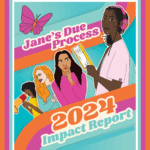By Rosann Mariappuram and Morgan Shelburne
Rosann and Morgan are the president and vice-president of UT Law’s Law Student Students for Reproductive Justice chapter. They are both JDP hotline volunteers, and Rosann is this summer’s JDP legal intern.
When a teen has a child, they assume parental authority over that child. As a parent the teen is responsible for making legal and medical decisions on their child’s behalf.
At the same time, Texas law requires that a minor obtains parental consent in order to receive an abortion — even she is already a mother. The key assumption behind this policy is that minors are not capable of making responsible legal or medical decisions on their own.
This creates a classic Catch-22. Texas law says minors cannot make the decision to obtain an abortion on their own, and are thus forced to stay pregnant and assume all of the legal, medical, and financial responsibilities of caring for an infant.
A minor can resolve the contradiction of parental consent laws by securing a judicial bypass, but this requires the teen to convince a judge that she is “mature and well-informed” enough to consent to abortion care or that involving her parent in the decision would not be in her “best interest.”
This Catch-22 is even more absurd for pregnant minors who are already parents. For example, say a teen had a child at 15 and then at 17, she finds herself pregnant again. If she decides she does not want to stay pregnant, she still needs to obtain parental consent to have an abortion – even though she is a parent herself!
Mothers under the age of 18 cannot vote, cannot sign a lease, cannot open a bank account, and cannot receive medical services, including family planning services, on their own. The only way to correct this contradiction is to seek emancipation or get married, both of which can cost a teen any kind of support from her parents.
Jane’s Due Process (JDP) serves teens who are caught in this unconstitutional loop. Rather than shaming teenage parents who are seeking abortion services, JDP provides them with the legal support they need to make their own reproductive health decisions.
In Planned Parenthood v. Casey, the U.S. Supreme Court ruled that states are prohibited from placing an undue burden on, or a substantial obstacle in front of, women seeking abortion care. So how can the Catch-22 that teenage parents face when seeking an abortion be considered constitutional? The answer is that it shouldn’t.
In one Texas case, a judge denied a teen’s request by saying she failed the ‘maturity’ prong of the judicial bypass standard. The judge found that the teen not telling her parents about her pregnancy was proof of her lack of maturity: creating a second, absurd Catch-22. Furthermore, the judge made this finding when faced with evidence that the teen needed to conceal the pregnancy for her safety and to ensure a roof over her and her baby’s head – the reason she was seeking a judicial bypass in the first place!
Rather than working to correct the injustice of parental consent laws, Texas is increasing the chance that teens seeking abortion care will be denied. The judicial bypass laws were expanded in 2015 with the passage of HB 3994. The new law, paired with rules from the Texas Supreme Court on how to implement it, took effect in January of 2016 and is making it even harder for teens to obtain abortion care in Texas.
Jane’s Due Process remains committed to pushing back on restrictive legislation and helping teens in Texas obtain their constitutionally protected rights.




